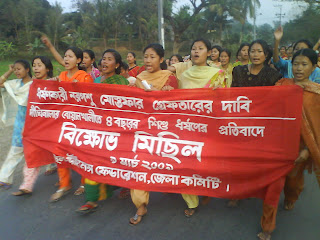Zee News, 14 February 2008,
http://www.zeenews.com/nation/2009-02-14/507534news.htmlAizawl, Feb 14: More than 35,000 people, majority of them belonging to the Chakma community are facing difficulty in the ongoing fencing along the 318-km long Mizoram-Bangladesh border but Mizoram government says they are not 'displaced'.
The Mizoram Home department, in reply to the complaint filed by the Asian Indigenous and Tribal People's Network (AITPN) to the National Human Rights Commission (NHRC), said that the Chakmas along the Indo-Bangladesh border are not 'displaced' as the fencing line is not along the international border.
Deputy Secretary of Home Department Romawia said the families fenced out by the ongoing border fencing can remain outside the fencing or shift from the outside to the inner side.
"There is no objection if the 'fenced-out' families continue to reside outside the fencing," Romawia wrote in response to the AITPN's complaint which put the number of people to 35,000.
Reports said the entire Tarabonye hamlet has fallen outside the border fence and the families were prevented by the Bangladesh Rifles (BDR) personnel from collecting river sand for sale, which was earlier their main source of income. Former state Chief Secretary Haukhum Hauzel was informed by villagers of Bindiasora, where around 80 families now fall outside the fence, about their plight, reports said. The government maintained that those affected by fencing were being compensated appropriately.
However, disputing the government's claim the Chakma residents ask "if we are not called displaced then who can be so?" A Chakma resident of Tarabonye hamlet said the villagers lodged a complaint to the Chief Secretary last year alleging inadequate compensation. Four public sector companies undertook the Mizoram-Bangladesh border fencing works. But neither the Centre nor the state government has publicly announced any resettlement and rehabilitation plan, the NGOs claimed.
Bureau Report
